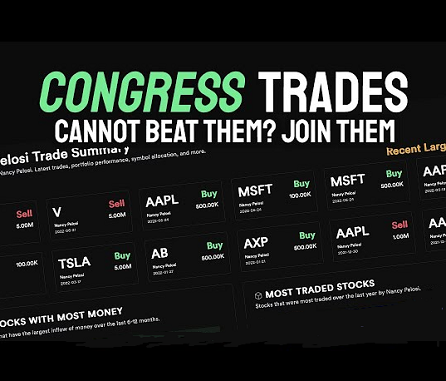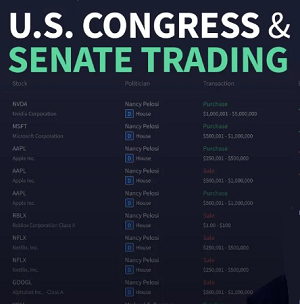
The Influence of Election Season on the Economy and Stock Market
Election season consistently impacts the economy and stock market, but the last decade has revealed a deeper connection between political actions and market performance, particularly involving Congress. Despite attempts to address ethical concerns surrounding insider trading, the gap between the wealthiest 1% and retail traders has never been clearer. Frustrated by this disparity, many traders have opted for a new approach: if they can’t outsmart the system, they might as well join it.
The intersection of politics and investing is transforming the stock market landscape as traders increasingly focus on the investment activities of lawmakers. This shift has given rise to a strategy where investors attempt to replicate the trading patterns of members of Congress, who may possess privileged information. As scrutiny over congressional trading intensifies, savvy investors are beginning to capitalize on this transparency, creating a blend of political insight and financial opportunity. The media is portraying this trend as a way to rethink investment strategies, challenge ethical boundaries, and provide retail investors with a controversial edge in the market.
But does following congressional trades lead to genuine success for retail traders, or is it merely a distraction that allows the wealthy to amass even more wealth? With the presidential election on the horizon, this article will explore the implications of this “political trading” phenomenon and determine whether it genuinely levels the playing field or obscures a decade of deception.
Review Quiver Quantitative Congress Trading Dashboard for Recent Congressional Trades

The Relationship Between Congress and the Public
Americans generally hold a low opinion of Congress, as much of its work remains behind closed doors, yet one aspect is transparent: the stocks they choose. As lawmakers prepare for the upcoming presidential transition in 2025, their stock-picking prowess has caught the attention of traders and investors, particularly since 2021. Many traders remain unaware that they can access public data to track which members of Congress are required to report their stock market gains.
The roots of this trend trace back to the STOCK Act of 2012, intended to curb insider trading among lawmakers but instead generating unforeseen consequences that have altered the investment landscape. Designed to enhance transparency and prevent abuses of privileged information, the Act mandates the public disclosure of congressional stock transactions exceeding $1,000. Ironically instead of deterring congressional trading it has spotlighted it, prompting traders to leverage this information for their advantage. Now traders and financial firms utilize these public reports to create products and strategies that mimic lawmakers’ trading activities, with companies offering tools to track these potentially profitable trades.
Emergence of Political Trading ETFs
While retail traders may not have the capital to completely emulate the investment strategies of politicians, this has given rise to a niche market of “political trading” funds and ETFs designed to capitalize on lawmakers’ perceived informational advantages. These investment vehicles such as NANC which tracks Democratic trades, and KRUZ which follows Republican trades, allow investors to mimic political stock transactions.
However while these funds have gained traction, they also lead traders into risky territory. The excitement of investing like politicians raises significant ethical and fairness concerns in the stock market, prompting discussions on whether rules need to be reformed. Those who find success with these ETFs may become blinded by short-term gains, failing to recognize that they are in effect, capitalizing on insider trading practices that could backfire.
The mechanisms intended to curb questionable trading practices have instead created new opportunities for investors to profit from congressional financial activities, calling into question the effectiveness of the STOCK Act and the ethical implications of these investment strategies. While most retail traders lack access to the inside information enjoyed by the wealthy, they can analyze publicly available data to identify potential market movers.
Navigating the Follow-the-Leader Strategy
Although some investors have found success with these ETFs, many traders are discovering that this “follow-the-leader” approach can lead to frustration and losses. The allure of insider information can be deceptive; stocks that seem ripe for investment often turn out to be misleading. Major news outlets have published articles claiming that the STOCK Act has enabled the little guy to succeed, urging traders to follow congressional earnings reports for clues.
However there’s an important caveat: the timing of these disclosures. Newer traders may see a recent stock report and rush to invest, while seasoned traders understand the potential pitfalls. Congressional members are only required to disclose their gains three weeks after the fact, a timeframe during which market conditions can change dramatically. Just look at the frenzy surrounding GameStop in 2021 to understand how quickly things can shift. The most astute traders recognize that once a stock’s success becomes public knowledge, it often loses its momentum as the market becomes saturated with speculative buying.
For instance following the trading moves of high-profile politicians like Nancy Pelosi can lead to miscalculations. While Pelosi herself may not trade stocks, her husband’s investment activities have garnered attention, particularly for substantial investments in technology and timely options trades. This has sparked speculation about potential insider information and prompted many retail investors to mimic these trades. Unfortunately by the time these transactions become public knowledge, the stock often loses value, leading traders on a wild goose chase. The so-called “Nancy Pelosi Effect” illustrates the complex relationship between political power, market dynamics, and public perception in today’s investment landscape.
Navigating the Entire Complex Landscape
The interaction between congressional trading and retail investing has created a contentious environment in the stock market. While the STOCK Act aimed to foster transparency and limit insider trading, it has inadvertently fueled a trend of “political trading,” allowing investors to replicate lawmakers’ actions. However this supposed democratization of insider information may not lead to fairer trading practices; instead, it highlights potential market manipulation and a false sense of opportunity that could mislead retail investors.
The rapid dissemination of information via social media has further amplified the effects of these trades, influencing market movements based on congressional actions. As retail investors grow more informed and empowered, their collective behavior increasingly shapes market trends and public policy discussions, especially as the 2025 election approaches.
Traders and investors must tread carefully as they explore these strategies. By the time congressional trades come to light, the potential for profit may have already diminished. The challenge lies not in mimicking others but in developing informed, independent investment strategies that can adeptly navigate the intricate relationships between politics, market forces, and public sentiment. For those ready to move beyond following the crowd, platforms like Trade Ideas can help you make smarter trading decisions this election season.
